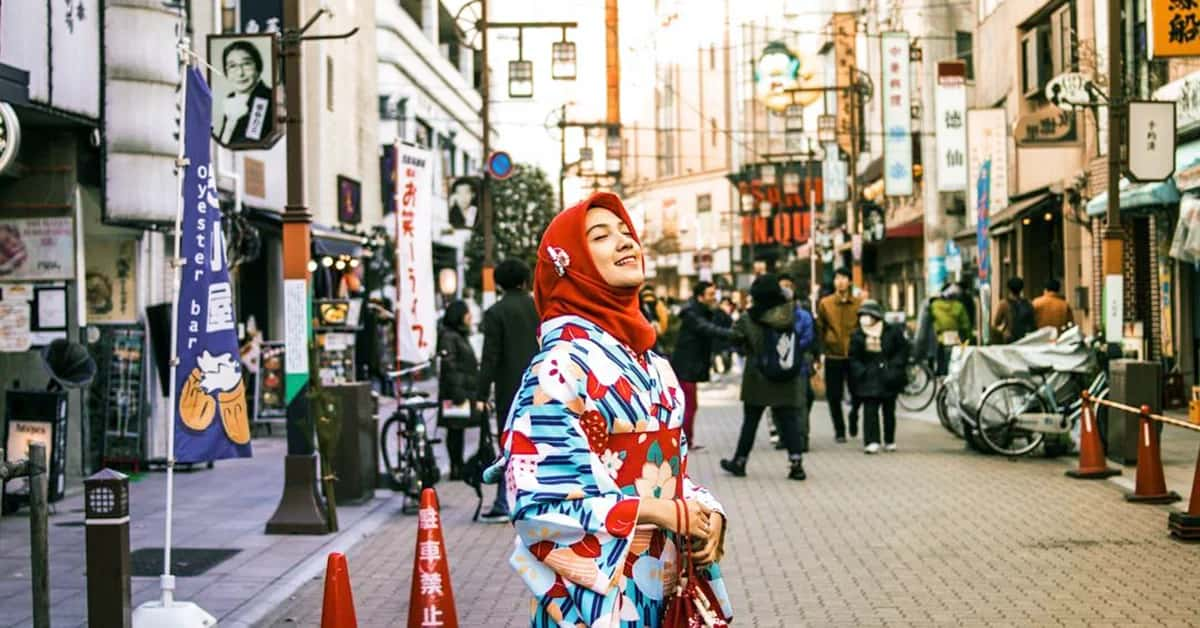The well-mannered and respectful culture of Japan is admired by tourists around the world. Any traveler would tell you that this cultural destination is steeped with many etiquettes to practice from greeting someone to dining in a restaurant.
While there are plenty of Japanese etiquettes to research and read, it can feel overwhelming at times.
Credit:@ardirafarizpasha on Instagram
If you’re visiting Japan anytime soon, here are some important etiquette tips that are perfect for first-time travelers.
[inlinewidget id=28144]
1. Greet with a small nod or bow
Travelers can expect to exchange a lot of bowing gestures during their time in Japan. It signifies appreciation or respect for each other’s presence. The degree of bowing differs according to the seniority of the person you’re paying your respect for.
The locals in Japan are generally accepting about foreigners not knowing the complete rules of bowing. Therefore, giving a small nod or bow in return would suffice.
2. DON'T be late!
It’s a well-known fact that the Japanese appreciate punctuality in anything they do, from the perfectly-timed public transportation to restaurant opening hours. If you plan to meet a friend or have a reservation in a restaurant in Japan, embrace the rules of punctuality and arrive early.
3. Practice the art of using chopsticks
Most restaurants in Japan offer chopsticks as dining utensils, and it’s important to dine with respect. When you’re sharing a communal dish with someone, pick up the food using your chopsticks and place them on your plate before eating it. It’s also crucial not to stick your chopsticks upright on a rice bowl as it signifies mourning for the dead. Once you’ve finished eating, place both chopsticks on the holder.
If you’re not confident with your chopstick skills, don’t be shy and politely request for a fork and spoon from the wait staff.
4. Finish your food!
While this is a common rule of courtesy in most countries, this dining etiquette is strongly emphasized in Japan. Seeing leftover food is disrespectful to the chef who prepared the meal for you. If you can, order moderately.
If you have dietary requirements to adhere to, let them know and most restaurants would replace the food item with something else.
5. DON'T burp or munch loudly
Burping or munching your food loudly is a definite no-no when dining in a Japanese restaurant. All food establishments here practice respect when they savour their meals in public.
In some local restaurants, loud conversations can be a disruptive experience for the locals who dine there as well. Hence, it’s best to be mindful of other diners when having your meal in a restaurant.
6. No tipping!
The culture of tipping is not practiced in Japan. Therefore, you don’t have to feel obligated to do so, especially when you’re from a country that practices tipping.
In fact, the locals would appreciate a ‘thank you’ instead. Practice saying ‘gochisosama deshita’, which means ‘Thank you for the meal!’.
7. Always remove your shoes
Similar to most Asian countries, removing your shoes before entering someone’s home is practiced in Japan. If you’re paying your friend a visit, leave your shoes outdoors and slip into the home slippers that are often placed at the doorstep.
8. DON'T bring in your wet umbrellas
This Japanese etiquette will come in handy when you’re visiting Japan during the rainy season. It’s typically best to leave your wet umbrellas or raincoats outside to prevent it from dripping all over the floors.
9. Always be respectful
Temples and shrines in Japan are sacred places of worship. Therefore, visitors are encouraged to behave respectfully and be mindful of the local worshippers around them.
When you step into the temple grounds, pay respect by performing a silent prayer before a sacred object. Most temples also offer incense sticks to be burned and placed inside the incense burner.
10. DON'T take pictures indoors
While the temple compound is open to picture-snapping, first-time travelers must be mindful of the temple signs that forbid indoor photography. Flash photography, for instance, can be disruptive for worshippers who are praying in the temple.
11. Hone your gift wrapping skills
Japan is also recognised for their excellent gift wrapping skills, which explains the abundance of pretty wrappers and origami-style boxes. When you’re buying a gift for someone, take the extra effort and have it wrapped neatly. Alternatively, you can place them in a lovely gift bag too.
12. Steer clear of giving presents with unlucky numbers
Any gift that involves the number 4 and 9 are considered unlucky by the Japanese, which includes gift sets and souvenirs. Be extra careful when you’re exchanging presents with a local. Aside from that, giving clocks, combs, scissors, or knives to someone are highly discouraged.
Learning important Japanese etiquettes before your first trip to Japan can save you from any social faux pas. The next time you’re heading to a ramen restaurant in Tokyo or visiting an ancient temple in Kyoto, do keep these etiquette tips in mind ?
[inlinewidget id=28208]


